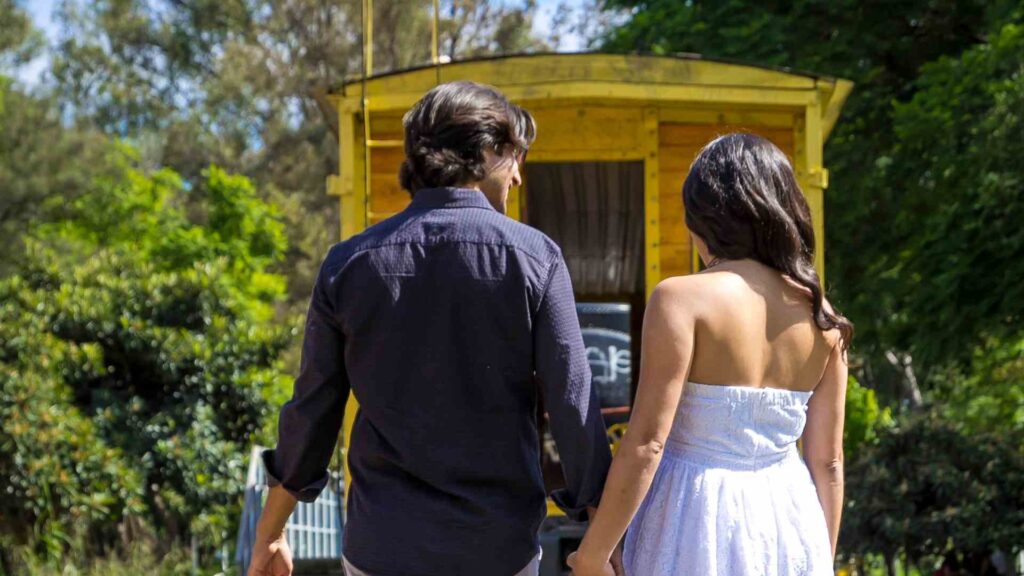Keeping the spark alive in a relationship is crucial for maintaining passion and connection.
This guide offers practical tips and insights to help couples rekindle their romance and build a lasting, vibrant bond.
Understanding the Spark
Defining the Spark
What does “the spark” mean in a relationship?
- The spark is the excitement, passion, and emotional connection that makes a relationship feel special and alive.
- It includes the thrill of new love, the butterflies in your stomach, and the intense desire to be with your partner.
How the spark evolves over time
- In the beginning, the spark is often intense and effortless.
- As the relationship matures, the initial intensity may wane, but the spark can transform into a deeper, more enduring connection.
- Recognizing this evolution helps set realistic expectations and encourages growth.
Recognizing When the Spark is Fading
Signs that the relationship might be losing its excitement
- Decreased Physical Intimacy: Reduced frequency of physical affection and sexual activity.
- Lack of Communication: Conversations become mundane or revolve around routine matters only.
- Routine and Predictability: The relationship feels stuck in a rut, with little spontaneity or excitement.
- Emotional Distance: Feeling more like roommates than romantic partners.
- Decreased Interest: Lack of enthusiasm for spending time together or engaging in shared activities.
The impact of a fading spark on the relationship
- Emotional Disconnect: A loss of the spark can lead to feelings of loneliness and dissatisfaction.
- Increased Conflict: Without the buffer of romance and connection, conflicts can become more frequent and intense.
- Risk of Infidelity: A fading spark may lead some individuals to seek excitement outside the relationship.
- Loss of Future Vision: Without a strong connection, partners may struggle to envision a shared future, weakening the relationship’s foundation.
By understanding what the spark is and recognizing the signs of its fading, couples can take proactive steps to rekindle their connection and maintain a vibrant, loving relationship.
This awareness is the first step towards keeping the spark alive and ensuring a lasting bond.

Communication is Key
The Foundation of Connection
Importance of open and honest communication
- Open communication builds trust and understanding between partners.
- Sharing thoughts and feelings helps prevent misunderstandings and resentment.
- Honest conversations foster a deeper emotional connection.
How to communicate effectively with your partner
- Be Clear and Direct: Express your thoughts and needs without ambiguity.
- Use “I” Statements: Frame your feelings from your perspective to avoid sounding accusatory (e.g., “I feel…” instead of “You always…”).
- Stay Calm: Approach discussions with a calm demeanor, especially during conflicts.
Active Listening
Techniques to become a better listener
- Give Full Attention: Put away distractions like phones or TV and focus on your partner.
- Show Interest: Nod, make eye contact, and use verbal cues like “I see” or “Go on.”
- Reflect and Clarify: Paraphrase what your partner has said to ensure understanding (e.g., “So what you’re saying is…”).
Showing empathy and understanding
- Validate Feelings: Acknowledge your partner’s emotions even if you don’t agree with their perspective.
- Express Empathy: Show that you care about their feelings and experiences (e.g., “That sounds really tough.”).
- Avoid Judgment: Listen without interrupting or jumping to conclusions.
Expressing Feelings and Needs
How to articulate your emotions and desires without conflict
- Choose the Right Time: Avoid bringing up sensitive topics during stressful moments.
- Be Specific: Clearly state what you need or how you feel instead of generalizing.
- Stay Positive: Focus on positive outcomes and what you want to achieve together.
Encouraging your partner to share openly
- Create a Safe Space: Make it clear that your partner can speak freely without fear of criticism or judgment.
- Ask Open-Ended Questions: Encourage deeper conversation by asking questions that require more than yes or no answers (e.g., “How do you feel about…?”).
- Listen and Respond: Show that you value their input by listening carefully and responding thoughtfully.
Effective communication is the cornerstone of any strong relationship. By honing your communication skills and creating an environment of open, honest dialogue, you can strengthen your connection and keep the spark alive.
Quality Time Together
Prioritizing Time for Each Other
The importance of spending quality time together
- Quality time strengthens the emotional bond and fosters a deeper connection.
- It helps you understand each other better and keeps the relationship dynamic.
- Shared experiences create lasting memories and reinforce the partnership.
Finding time amidst busy schedules
- Schedule Regular Time Together: Set aside specific times each week dedicated to your partner.
- Combine Activities: Integrate time together into your daily routines, like cooking or exercising together.
- Be Present: Make the most of the time you do have by being fully engaged and present.
Date Nights
Creative date night ideas for any budget
- At-Home Movie Night: Create a cozy home theater experience with popcorn and your favorite movies.
- Outdoor Picnic: Enjoy a meal together at a local park or in your backyard.
- DIY Projects: Work on a fun craft or home improvement project together.
- Cooking Challenge: Choose a new recipe and cook dinner together.
Making date nights a regular part of your routine
- Consistency is Key: Aim for at least one dedicated date night per week.
- Mix It Up: Vary your date night activities to keep things exciting and fresh.
- Prioritize It: Treat date nights as non-negotiable appointments in your calendar.
Shared Interests and Activities
Discovering and nurturing common hobbies
- Explore New Interests Together: Try out new hobbies or activities to find shared passions.
- Revive Old Favorites: Revisit activities you both enjoyed earlier in your relationship.
- Attend Classes or Workshops: Learn something new together, like a cooking class, dance lessons, or a language course.
The benefits of trying new things together
- Builds Excitement: New experiences add excitement and novelty to the relationship.
- Strengthens Bond: Overcoming challenges and learning new skills together enhances teamwork and cooperation.
- Creates Memories: Shared adventures create unique and cherished memories.
Quality time is essential for maintaining a strong, vibrant relationship. By prioritizing time together, incorporating regular date nights, and exploring shared interests, couples can keep their connection strong and ensure the spark remains alive.

Keeping Romance Alive
The Little Things Matter
Small gestures that make a big difference
- Compliments: Regularly compliment your partner on their appearance, efforts, and qualities.
- Random Acts of Kindness: Do something thoughtful for your partner without any special occasion, like bringing them their favorite treat or leaving a sweet note.
- Express Gratitude: Regularly thank your partner for the things they do, both big and small.
Daily habits to keep romance alive
- Morning and Evening Rituals: Start and end the day with a loving gesture, like a kiss or a few minutes of conversation.
- Check-Ins: Take a few moments each day to check in with each other emotionally.
- Physical Touch: Hold hands, hug, and maintain physical closeness throughout the day.
Surprises and Spontaneity
The power of unexpected acts of love
- Surprise Dates: Plan a surprise date or outing to break the routine and add excitement.
- Unexpected Gifts: Give small, thoughtful gifts that show you’ve been thinking about your partner.
- Love Notes: Leave little love notes or messages in unexpected places, like their wallet, lunchbox, or car.
Planning spontaneous adventures and surprises
- Weekend Getaways: Plan a spontaneous trip or staycation to explore new places together.
- Surprise Celebrations: Celebrate minor milestones or achievements with a surprise dinner or activity.
- Switch Up Routines: Occasionally change your daily routines to keep things interesting, like having breakfast in bed or taking a different route for your evening walk.
Physical Affection
The role of touch in maintaining intimacy
- Non-Sexual Touch: Regular physical touch, such as hugs, holding hands, or cuddling, fosters a sense of closeness and security.
- Public Displays of Affection: Small gestures like a quick kiss or an arm around the shoulder in public can strengthen your bond.
- Massage and Pampering: Give each other massages or engage in activities that involve caring physical touch.
Ways to incorporate more physical affection into daily life
- Morning and Nighttime Routine: Start and end your day with a hug or kiss.
- Casual Touches: Touch your partner affectionately during casual interactions, like a pat on the back or a playful nudge.
- Dance Together: Spontaneously dance together in the kitchen, living room, or anywhere that feels right.
Keeping romance alive requires ongoing effort and attention to the little things that make a big difference.
By incorporating small gestures, surprises, and physical affection into your daily routine, you can maintain the excitement and passion in your relationship, ensuring that the spark remains vibrant and strong.

Maintaining Intimacy
Emotional Intimacy
Building and nurturing emotional closeness
- Deep Conversations: Set aside time for deep, meaningful conversations about your dreams, fears, and aspirations.
- Share Vulnerabilities: Open up about your insecurities and encourage your partner to do the same, fostering a safe space for honesty.
- Be Supportive: Show empathy and understanding during tough times, offering a shoulder to lean on.
The importance of vulnerability
- Strengthens Trust: Sharing your vulnerabilities builds trust and deepens your emotional connection.
- Promotes Understanding: Helps partners understand each other’s inner worlds, leading to greater empathy and closeness.
- Enhances Bond: Creates a strong, unbreakable bond that can withstand challenges and stress.
Physical Intimacy
Keeping the sexual spark alive
- Open Communication: Talk openly about your desires, fantasies, and boundaries to ensure both partners feel satisfied and respected.
- Experiment and Play: Try new things in the bedroom to keep the experience exciting and fresh.
- Schedule Intimacy: Make time for intimacy, even if it means scheduling it into your busy lives to ensure it remains a priority.
Overcoming common sexual challenges
- Addressing Mismatched Libidos: Find a compromise that works for both partners and seek professional help if needed.
- Managing Stress and Fatigue: Prioritize rest and relaxation to maintain energy and interest in intimacy.
- Dealing with Physical Changes: Communicate openly about any physical changes or discomforts and explore new ways to experience pleasure.
Intimacy Through Connection
Deepening your bond through shared experiences
- Travel Together: Explore new places and create lasting memories through shared adventures.
- Participate in Rituals: Establish regular rituals, such as a weekly date night or annual trips, that reinforce your bond.
- Celebrate Milestones: Acknowledge and celebrate relationship milestones, such as anniversaries and achievements, to reinforce your connection.
Building rituals and traditions as a couple
- Daily Rituals: Incorporate small daily rituals, like a morning coffee together or an evening walk, to maintain connection.
- Holiday Traditions: Create and uphold holiday traditions that are meaningful to both of you, adding a sense of continuity and joy to your relationship.
- Special Occasions: Make a big deal out of special occasions, whether it’s a birthday, promotion, or personal achievement, to celebrate your partnership.
Maintaining intimacy, both emotional and physical, is crucial for a healthy, vibrant relationship. By focusing on building emotional closeness, keeping the sexual spark alive, and deepening your bond through shared experiences and rituals, you can ensure that the intimacy in your relationship remains strong and fulfilling.
Individual Growth and Self-Care
Supporting Each Other’s Growth
Encouraging personal development
- Set Personal Goals: Encourage each other to set and pursue personal goals, whether they are career-related, hobbies, or self-improvement.
- Celebrate Achievements: Acknowledge and celebrate each other’s accomplishments, no matter how small.
- Be a Cheerleader: Offer support and encouragement during challenging times and milestones.
Balancing independence and togetherness
- Respect Individual Space: Allow each other time and space for individual pursuits and interests.
- Pursue Separate Hobbies: Engage in hobbies or activities independently to maintain a sense of individuality.
- Stay Connected: Balance time apart with quality time together to ensure both partners feel valued and connected.
Self-Care for Relationship Health
The impact of self-care on the relationship
- Reduces Stress: Self-care helps manage stress, making it easier to be present and supportive in the relationship.
- Improves Mood: Taking time for yourself can boost your mood and overall well-being, positively impacting your interactions with your partner.
- Enhances Energy: Regular self-care routines ensure you have the energy to invest in your relationship.
Creating a self-care routine that supports both partners
- Individual Self-Care: Encourage each other to engage in activities that promote personal well-being, such as exercise, meditation, or hobbies.
- Joint Self-Care Activities: Participate in self-care activities together, like couple’s yoga, cooking healthy meals, or taking relaxing walks.
- Set Boundaries: Establish and respect boundaries that allow for personal time and space, ensuring both partners have the opportunity to recharge.
Supporting each other’s growth and prioritizing self-care are essential for maintaining a healthy, vibrant relationship.
By encouraging personal development, balancing independence and togetherness, and incorporating self-care routines that support both partners, you can create a strong foundation that allows your relationship to thrive.

Handling Challenges Together
Navigating Conflicts
Healthy ways to resolve disagreements
- Stay Calm: Keep a level head and avoid raising your voice, even when discussing heated topics.
- Focus on the Issue, Not the Person: Attack the problem, not each other, and avoid personal attacks.
- Seek Compromise: Look for mutually acceptable solutions rather than trying to “win” the argument.
Learning to fight fair and forgive
- Use “I” Statements: Express your feelings without blaming your partner (e.g., “I feel upset when…”).
- Take Breaks: If a discussion gets too heated, take a break and come back to it later when both parties are calmer.
- Practice Forgiveness: Let go of grudges and focus on moving forward rather than dwelling on past mistakes.
Dealing with External Stress
Managing the impact of external stressors on your relationship
- Communicate Openly: Share your external stresses with your partner and discuss how they affect you.
- Support Each Other: Be a source of support and understanding when external pressures mount.
- Create a Safe Haven: Make your relationship a safe and stress-free zone where both partners can relax and recharge.
Supporting each other through tough times
- Be Present: Offer a listening ear and a comforting presence during challenging times.
- Show Empathy: Acknowledge your partner’s feelings and provide emotional support.
- Offer Practical Help: Assist with tasks or responsibilities to ease your partner’s burden.
Seeking Help When Needed
When and how to seek professional help
- Recognize the Signs: Identify when conflicts or issues are beyond your ability to resolve alone.
- Be Open to Counseling: Understand that seeking professional help is a sign of strength, not weakness.
- Choose the Right Therapist: Find a therapist or counselor who specializes in relationship issues and with whom both partners feel comfortable.
The benefits of couples therapy and counseling
- Objective Perspective: A therapist provides an unbiased view and helps identify underlying issues.
- Improved Communication: Therapy teaches effective communication techniques and conflict-resolution strategies.
- Strengthened Connection: Counseling can help rekindle intimacy and understanding, leading to a stronger relationship.
Handling challenges together is a crucial aspect of maintaining a healthy relationship. By navigating conflicts healthily, managing external stress, and seeking professional help when needed, couples can overcome obstacles and emerge stronger, ensuring the spark in their relationship remains bright and vibrant.
Keeping the Spark Alive Long-Term
Long-Term Goals and Dreams
Setting and pursuing shared goals
- Identify Common Aspirations: Discuss and identify long-term goals that excite both partners, such as travel plans, financial milestones, or personal achievements.
- Create a Vision Board: Visualize your shared goals by creating a vision board together.
- Regularly Revisit Goals: Schedule regular check-ins to discuss progress and adjust goals as needed.
Keeping the future exciting and hopeful
- Plan Adventures: Regularly plan new and exciting activities or trips to look forward to.
- Celebrate Milestones: Acknowledge and celebrate your achievements together, both big and small.
- Stay Curious: Keep exploring new interests, hobbies, and opportunities for growth as a couple.
Revisiting and Renewing Your Relationship
Regular check-ins and relationship tune-ups
- Schedule Regular Check-Ins: Set aside time every few months to discuss the state of your relationship, what’s working, and what could improve.
- Ask Reflective Questions: Use open-ended questions to explore each other’s feelings and perspectives (e.g., “How do you feel about our relationship right now?”).
- Set New Intentions: Based on your discussions, set new intentions or goals for your relationship.
Celebrating milestones and achievements together
- Anniversaries: Make a tradition of celebrating your anniversary in a special way each year.
- Personal Achievements: Celebrate individual milestones as a couple, such as career advancements or personal goals.
- Relationship Milestones: Mark significant moments in your relationship, such as the day you met or moved in together, with special celebrations.
Continuous Effort and Commitment
The importance of ongoing effort and dedication
- Consistent Effort: Understand that maintaining a strong relationship requires continuous effort from both partners.
- Daily Acts of Love: Incorporate small, daily acts of love and appreciation into your routine.
- Stay Committed: Reaffirm your commitment to each other regularly, especially during tough times.
Maintaining a mindset of growth and improvement
- Embrace Change: Be open to change and growth, both individually and as a couple.
- Seek Knowledge: Read books, attend workshops, or seek resources that help improve your relationship.
- Learn from Challenges: View challenges as opportunities for growth and learning rather than setbacks.
Keeping the spark alive long-term requires effort, dedication, and a proactive approach to nurturing your relationship.
By setting and pursuing shared goals, regularly revisiting and renewing your connection, and maintaining a mindset of continuous improvement, you can ensure that your relationship remains vibrant and fulfilling for years to come.


